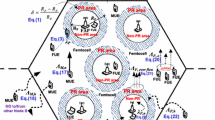Abstract
Handover blocking of ongoing calls due to the mobility of users is a quantity that determines at most the Quality of Service (QoS) in microcellular and picocellular G3G systems environments. In this paper we propose a call admission policy, based on the fractional guard channel scheme, which additionally considers the blocking of new calls. Simulation results show that the proposed policy gives an improved system performance, compared to the most commonly used handover algorithms.
Access this article
We’re sorry, something doesn't seem to be working properly.
Please try refreshing the page. If that doesn't work, please contact support so we can address the problem.
Similar content being viewed by others
References
U. Amin and S. Chennakeshu, The evolution of TDMA to 3G, IEEE Personal Communications 6 (1999) 6–7.
C.-J. Chang, T.-T. Su and Y.-Y. Chiang, Analysis of a cutoff priority cellular radio system with finite queueing and reneging/dropping, IEEE/ACM Transactions on Networking 2(2) (April 1994) 166–174.
S.K. Das, S.K. Sen and R. Jayaram, A dynamic load balancing strategy for channel assignment using selective borrowing in cellular mobile environment, Wireless Networks 3 (1997) 333–347.
E. Del Re, R. Fantacci and G. Giambene, Handover queuing strategies with dynamic and fixed channel allocation techniques in low Earth orbit mobile satellite systems, IEEE Transactions on Communications 47(1) (1999) 89–102.
R. Guerin, Queuing-blocking system with two arrival stream and guard channels, IEEE Transactions on Communications 36(2) (1988) 153–163.
D. Hong and S.S. Rappaport, Traffic model and performance analysis for cellular mobile radio telephone systems with prioritized and non prioritized handoff procedures, IEEE Transactions on Vehicular Technology VT-35 (August 1986) 77–92.
M. Mandjes and K. Tutschku, Effcient call handling procedures in cellular mobile systems, University of Würzburg Research Report Series, No. 144 (1996).
T. Norp and A.J.M. Roovers, UMTS integrated with B-ISDN, IEEE Communications Magazine (November 1994) 60–65.
I. Panoutsopoulos, S. Kotsopoulos, K. Ioannou and S. Louvros, Priority technique for optimizing the handover procedure in personal communication systems, Electronics Letters 36(7) (March 2000) 669–670.
R. Ramjee, R. Nagarajan and D. Towsley, On optimal call admission control in cellular networks, University of Massachusetts Technical Report UM-CS-1995-064 (1995).
H. Takagi, K. Sakamaki and T. Miyashiro, Call loss and forced termination probabilities in cellular radio communication networks with non-uniform traffic conditions, IEICE Transactions on Communications E82-B(9) (1999) 1496–1504.
P. Tran-Gia and M. Mandjes, Modelling of customer retrial phenomenon in cellular mobile networks, University of Würzburg, Institute of Computer Science, Research Report No. 142 (August 1996) pp. 1–19.
Author information
Authors and Affiliations
Rights and permissions
About this article
Cite this article
Panoutsopoulos, I.C., Kotsopoulos, S. & Tountopoulos, V. Handover and New Call Admission Policy Optimization for G3G Systems. Wireless Networks 8, 381–389 (2002). https://doi.org/10.1023/A:1015538606953
Issue Date:
DOI: https://doi.org/10.1023/A:1015538606953




